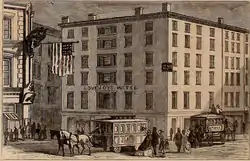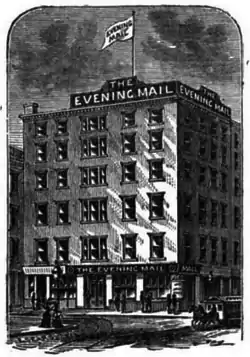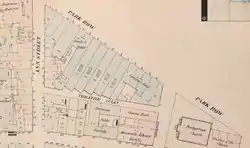Lovejoy's Hotel
Lovejoy's Hotel was a New York City hotel from the 1830s through 1870. It was located at the corner of Park Row and Beekman Street in a six-story building in the Civic Center neighborhood of Manhattan.[1] The Astor House hotel was opposite it.
| Lovejoy's Hotel | |
|---|---|
 Lovejoy's Hotel in 1864 | |
| General information | |
| Location | Park Row & Beekman Place, Manhattan, New York City, U.S. |
| Coordinates | 40.7115°N 74.0071°W |
| Completed | 1830s |
| Demolished | 1889 |
History

Jonathan Lovejoy was the original proprietor. John P. Huggins later purchased the hotel.[2] Huggins ran the hotel for approximately twenty years before purchasing the Cosmopolitan Hotel with his two brothers.[3][4]
In 1852, Alvan E. Bovay, a future founder of the United States Republican Party, dined with Horace Greeley at Lovejoy's during the 1852 Whig National Convention. They discussed the need for a new national party, and Bovay suggested it be called the "Republican" party.[5][6]
The hotel was among those the "Confederate Army of Manhattan" attempted to burn down in November 1864.[7]
Horatio Alger, Jr. mentions Lovejoy's in his 1868 novel Ragged Dick.
Closure
The hotel closed in 1870 and was converted into offices.[1] By now Park Row was dominated by newspapers, and subsequent tenants of the building included the New York Evening Mail and the Rural New Yorker.[8]
The building suffered some damage in the January 1882 fire that destroyed the former Potter Building (and former home of the New York World).[9] But it remained standing until around 1888 or 1889.[10][11]

References
- (26 March 1870). The Last of Lovejoy's Hotel, The New York Times
- Mower, Henry S. Reminiscences of a Hotel Man of Forty Year's Service, pp. 76–77 (1912)
- Merrill, Georgia Drew (ed.) History of Carroll County, New Hampshire, p. 388 (1889)
- (11 September 1902). John P. Huggins (obituary), The New York Times
- History of the Republican Party, pp. 151–53 (1884)
- Lyke, Tim (27 April 2011). Editorial: No dispute: Bovay gave GOP its name, Ripon Press
- Hansen, Gretchen (21 October 2012). The 1864 Plot To Burn Down New York City, BBC America
- (15 August 1872). Weekly Evening Mail advertising, Weekly Trade Circular, p. 156
- (1 February 1882). Surrounding Property Damaged, The New York Times
- Testimony of Nelson S. Flock, Appellate Record, Storms v. New York Elevated Railroad Company, Court of Appeals of the State of New York, p. 84 (1903)
- "Life in the Metropolis".
External links
- 1860 hotel envelope with building sketch, at Columbia University Libraries